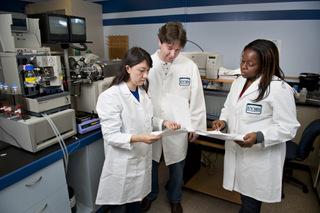Course descriptions
BP 700: Molecules to Cells (2 credits)
This course presents the basic cellular functions and processes. This course is divided into three modules which study genome and gene expression, biochemistry of the cell, cell organelles, the cytoskeleton and protein trafficking.
BP 701: Molecular and Cellular Techniques (2 credits)
This course provides an understanding of research techniques commonly employed in biomedical science research laboratories. Lectures cover molecular cloning and analysis, detection systems including PCR and real time PCR, working with proteins, basics of cell culture, and additional cutting-edge topics. Select techniques will be covered in the complementary hands-on laboratory component of this course.
BP 703: Cell Communication and Signaling (3 credits)
This is a foundational course covering basic cell membrane function, major cell signaling pathways, signaling pathway/network interaction, cell specialization, tissue histology and immunology.
BP 704: Molecular Genetics (2 credits)
This course covers key aspects of molecular genetics including the important concept of genetic screens as well as mutational analysis of gene and pathway function. Students learn the basic principles of Mendelian genetics, patterns of inheritance and human genetics; learn how model organisms (yeast, nematodes, flies, fish, mice) are utilized in the lab to study cellular pathways; and discuss the ethical considerations of genetic research.
BP 706: Cell Energetics and Organ Function (3 credits)
This course integrates elements of cellular metabolism with organ system physiology. Students will gain an understanding of and critically discuss the cellular metabolic pathways required for normal function and the systemic organ function with a focus on human physiology.
BP 819; BP 820; BP 821: Biomedical Sciences Lab Rotation I, II, III (2 credits each)
Students get hands-on laboratory experience in these lab rotations, with help from a pre-designated faculty member. These courses are designed for students to sample different types of research models, techniques and subject matter.
BP 709: Scientific Writing and Research Design (1 credit)
Students learn how to design and write a realistic research proposal (R21 NIH grant format), and gain a general understanding of how different techniques can be used to address a wide range of research questions. The final version of the proposals will be peer-reviewed and discussed in the format of an NIH grant study section.
BP 771: Methods and Logic in Translational Biology (4 credits)
This is an advanced course that emphasizes the key elements required to successfully design and conduct translational projects. The course serves as a bridge between basic research and the clinical manifestations of disease, and covers therapies of the future that are still under development.
BP 708: Oral Communication Forum (1 credit)
Students host seminar presentations in various research areas such as tumor biology, infectious diseases, immunology, molecular cell biology, cardiovascular and reproductive physiology, endocrinology and neuroscience. Journal articles describing major scientific advances are discussed and critiqued.
BP 781: Applied Biostatistics and Bioinformatics (3 credits)
This course is structured into three independent modules: biostatistics, bioinformatics and structural bioinformatics. The biostatistics module provides an introductory overview of the concepts behind and practical use of statistical analysis as it relates to the life sciences. The bioinformatics module provides an overview of basic bioinformatics concepts and commonly used tools, to include databases and genomic/proteomic resources, sequence analysis and genetic mapping, gene expression concepts, IPA and omic data analysis. The structural bioinformatics module provides students with fundamental knowledge of structural bioinformatics and computer-based approaches for protein structure visualization, comparison and classification.
BP 883: Responsible Conduct in Science (1 credit)
Series of lectures exposes graduate students to moral and ethical dilemmas in biomedical sciences. The course also exposes students to peer review processes related to the submission of grants and manuscripts.
BP 898: Research (1-6 credits)
Students conduct research in the laboratory. This course is repeatable for credit.
BP 799: Thesis (1-6 credits)
A review of the literature and written presentation of research as the PhD thesis.
BP 795: Special Topics in Biomedical Sciences (1-3 credits)
Guided readings and discussions of current research topics in a specialized area. Prerequisite: instructor approval.

